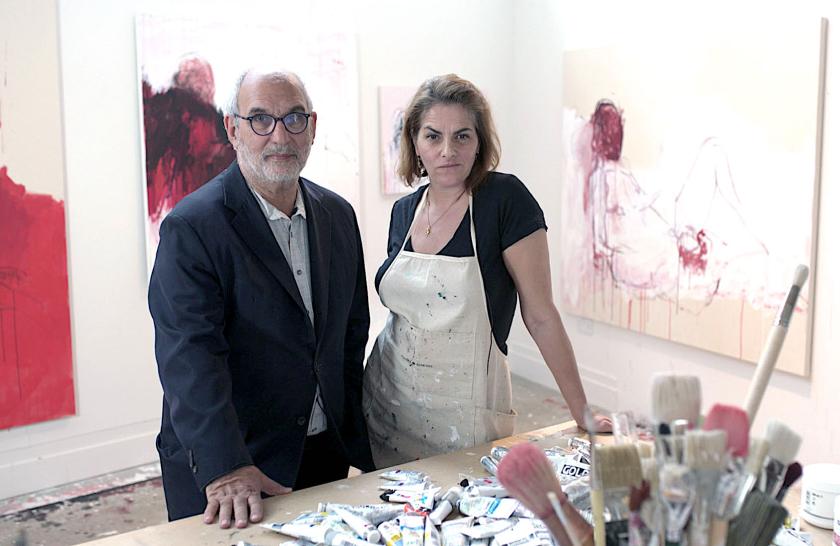It’s been a whirlwind year for Tracey Emin, CBE, RA. Her pink neon sign, “I want my time with you”, greets passengers at St Pancras station, she’s installed bronze birds all over Sydney city centre, she’s making a derelict print works in Margate into a living-space/studio that’s going to be like Rodin’s in Paris but “slightly bigger”, and she’s got married. To a large stone in her garden in the south of France. This was an empowering, really good, healthy thing, apparently. And she’s had Alan Yentob tailing her for 12 months for Imagine (BBC One).
You might think that we already know everything imaginable about Tracey Emin – that Hayward Gallery retrospective in 2011 covered vast swathes of her life and work, the two always inextricably, often tiresomely entwined – but now that she’s 55 and in what she calls, rather grimly, “the last bit” of her life, things are different, calmer. Although, at the same time, she’s very busy and energised, with a desperate need to paint, otherwise she feels she might “spontaneously combust”, as she tells a slightly nervous-looking Yentob.
She looks different too – lighter-haired, broader, middle-aged, in fact. After her mother died in Margate in 2016 – she’s still missing her profoundly – she decided she couldn’t leave the place. Before, when her work was so wrapped up in her childhood, she wouldn’t have been able to work there, but now, she says, it’s about the here and now and the future, not the past.
Still, the past is never far away, and this entertaining, though somewhat deferential, documentary only just manages to strike a balance between the two. But her chaotic early life, in its iconic tawdriness, is compelling, even if you’ve heard it all before: the hotel in Margate where she grew up – her mother changed her mind at the last minute about aborting her and her twin brother – her father’s double life, the plunge into poverty when he left, the rape at 13, leaving school at that same age, the sex with older men which stopped when she was 15 and decided it was time for “the age of reason” and almost became a dancer. She was put off her stride in a dance competition by a group of men she’d had sex with who shouted “Slag” at her when she was on stage.
There is something invigorating about the self-belief – or super-sized narcissism – that has carried her along
As Emin is such a self-documenter, we can admire her, beautiful and young, always with that crooked smile, dancing glamorously through the 90s and the days of the embroidered blankets – she won’t make them any more as there was such a queue of people waiting to buy them and making annoying requests for ones without swear words – as well as the solo White Cube show in 1993, the videos, the appliquéd armchair she took on her road trip across the USA with then boyfriend Carl Freedman, the famous Everyone I have Ever Slept With 1963-1995 tent (destroyed in the Momart warehouse fire in 2004) and, of course, the bed, nominated for the Turner prize in 1999 and recently exhibited, with gravitas, alongside Francis Bacon works at the Tate and Turner seascapes in the Turner Contemporary in Margate.
All these autobiographical installations, like them or not, have entered our collective consciousness. As art critic Louisa Buck says in the documentary, “You can’t ignore Tracey Emin. She makes you engage with her on her terms.” And there is something invigorating, almost hypnotic, about the self-belief – or super-sized narcissism – that has carried her along, ever since her letter to Margate police when she was 16 and working in Pillowtalk, a sex shop, for £1 an hour. She decided the “not very desirable” sex-shop owners should be investigated and wrote an anonymous letter that began, “Dear Margate Police Station, I am an artist.” Already, she had a vision of herself in her head. And the police listened, and investigated.
When she was a student at the Royal College of Art in her Byzantine phase, heavily influenced by Munch and Schiele – “Lots of people missed out on my Byzantine fresco Munch period, funnily enough” – she wanted her art to transform, to work alchemy. She needed, she says, to make a “massive intellectual leap”. Her tutors didn’t understand and told her patronisingly that she was doing very well, considering. After she left, she smashed up all her work in the courtyard, one of her few undocumented life events. This was followed, in a strange mirror-image of her own mother's situation, by getting pregnant with twins and a harrowing abortion, described in How it Feels. For a while she gave up painting, gave up believing in life, but through this trauma came to a greater understanding about the essence of creativity.
“The main ghost in my life is myself,” she tells Yentob, which seems significant. Maybe all that autobiographical work has a haunting effect. She believes strongly in the afterlife – she’s seen apparitions of her father – and, "almost scientifically", in the layering of time-dimensions, feeling sure that the eight-year-old and 14-year-old versions of herself are out there, walking around somewhere. Help! Will all the Tracy Emins meet and form a new whole? And can we cope with any more of them?














